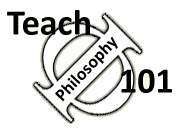Teach Philosophy 101
Free resources for
philosophy teachers!
"One of the most comprehensive, well-researched, and accessible guides for teachers that I have ever seen." James Lang, Chronicle of Higher Education (read full review of TΦ101)
Reading Assignments
TΦ101 believes that for many of our students, it is not enough just to say, "Read pages 23-46." If we are assigning a difficult text, we probably need to include both some guidance to make it clear to the students what they are expected to get from that text and some means of accountability. Here are a number of examples, but if you have other suggestions, please send them to us for consideration:
-
The simplest method of giving active reading assignments is to ask students specific questions about the text (with some way of determining if they have actually done these questions). E.g., Why does Descartes think he might be wrong in believing that is is certain that he is "sitting by the fire, wearing a winter dressing-gown"? Answers should be turned in to instructor before class. In the age of LLMs, you probably need to have students hand write their answers, or quote the a specific version of the text to support their answer to increase the probability that they actually answer the questions themselves.
-
"What does it say, what does it do?" One technique is to ask students to reflect on a particular passage and to summarize the passage, then to reflect on the function or purpose of the passage (Bean 45).
-
Double Entry Note Taking. Another form of active reading is to ask students to fill out a "double entry" matrix, which is a Classroom Assessment Technique. Students take notes in two columns; on the one side they list summaries of the reading, and on the other side they list a reaction, question, or connection of their own (Erickson, Peters, Strommer 124).
-
Daily Question Assignment. Students are asked to come to class with "the most interesting or important unanswered question from recent readings or lectures." The question must not have an easy or obvious answer, and students should be able to explain why it is interesting or important. Questions can be used as discussion starters or can be posted to on-line discussion boards. Submitted by Dan Werner, SUNY-New Paltz.
-
Pictures and Diagramming. Some reading assignments lend themselves to diagrams, so students can be assigned to produce a diagram of Plato's cave, Locke's theory of perception, a drawing of the Turing Test, etc. Submitted by Jenny McEarlean, Sienna College. See also Cassidy 2007, who makes use of stick figures. See also Mark Gaipa's "Breaking into the Conversation".
-
Pick a passage. A very simple reading assignment is to ask students to choose a passage from the text (or several passages) that they are prepared to read in class and say what they found interesting about it. This also helps the instructor understand how students responded to the reading.
-
Paraphrasing. Students often have trouble reading classic texts. This exercise asks them to paraphrase portions of texts to improve reading skills. (See Braver, 2005.)
-
Preparing for debates and journaling. Robert Boyd Skipper uses these two techniques to get his students to read difficult primary source materials. He describes this in detail in Aliteracy in the Philosophy Classroom.
-
Contract Grading. Joel Marks (University of New Haven) uses "contract grading" based on student's own reports of how many hours they spend doing the assignments and does not grade the quality of their work. Simultaneously Marks makes cheating an intellectual issue in the class: he argues that students learn more and cheat less than in other classes.
National Institute of Learning Outcomes Assessment
The National Institute for Learning Outcomes Assessment (NILOA) was founded in 2008 as an organization devoted to research and resource-development on using assessment to increase students learning. NILOA has compiled an assessment library of activities that have gone through an extensive peer review process. While they do not have a Philosophy-specific category, there are many resources that should be of interest to philosophy teacher.
Sources:
Bean, John. Engaging Ideas: The Professors Guide to Integrating Writing, Critical Thinking, and Active Learning in the Classroom. San
Francisco, Jossey-Bass, 1996.
Braver, Lee. "Paraphrasing," in APA Newsletter on Teaching Philosophy, 4:2 (2005): 6-8.
Cassidy, Lisa. "Appealing to Multiple Intelligences in the Classroom: Using Stick Figures to Teach Philosophy," Teaching Philosophy 30:3 (2007) 293-308.
Erickson, Bette LaSere, Calvin B. Peters, Diane Weltner Strommer. Teaching First-Year College Students. San Francisco: Jossey-Bass, 2006.
Marks, Joel. Cheating 101. Ethics as a Lab Course, Teaching Philosophy, 26.2 (2003):131-145.
Skipper, Robert Boyd. "Aliteracy in the Philosophy Classroom," Teaching Philosophy, 28.3 (2005): 261-276.
Author: John Immerwahr
Update: 15 November, 2015 (E. Tarver); June 2020 (E. Esch); 12-30-25--D. Sackris
